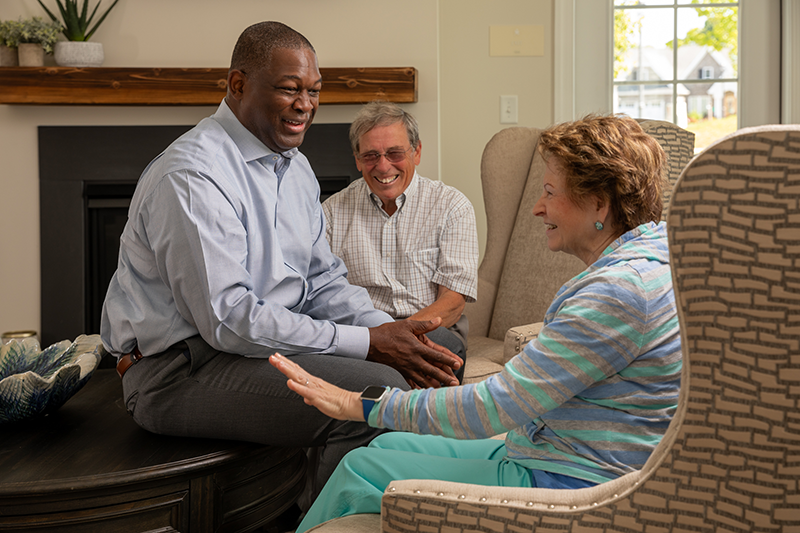The Impact of Retirement on Mental Health
How Retirement Affects Mental Health (and How Independent Living Can Help)

Retirement is a major life change that can have a significant impact on every aspect of your life. However, retirement can often influence the mental health of older adults more than anything else.
This isn’t always a bad thing. In fact, for some people, retirement can be a time of great freedom and joy! Not having to deal with going to work every day offers incredible opportunities to do whatever you want for what could be the first time in your life, and that amount of freedom and independence can be inspiring.
For many others, the effects of retirement on mental health can be negative. This time of great change can bring on stress, anxiety, and depression. With so many of us defining our lives by our careers, not having that structure and routine in our lives can leave us feeling unmoored.
Additionally, the lack of steady income can be a major source of anxiety for anyone. Yet these aren’t the only negative impacts of retirement on mental health. Here’s what you should know about mental health and retirement.
Contributing Factors

As mentioned above, it is important to note that not everyone experiences negative effects of retirement on their mental health. Some find that retirement is a time of great opportunity and satisfaction. They may enjoy having more time to spend with family and friends, pursuing hobbies and interests, or volunteering in their community.
However, there are factors that can contribute to the negative mental health impact of retirement. Let’s go over a few of the most common ones you might encounter personally. They include:
1. Loss of Identity
For many people, their job is a central part of their identity. When they retire, they may feel like they have lost a part of themselves. Not having this part of their identity is often difficult to reconcile.
2. Loss of Social Interaction
Retirement can lead to a decrease in social interaction, as people no longer have the same opportunities to interact with their colleagues and friends from work. Feelings of isolation are hard to surmount for many!
3. Decreased Financial Security
Retirement can lead to a decrease in financial security, which can add to stress and anxiety. Even for older adults who plan carefully to ensure they have sufficient retirement savings; the uncertainty can persist. Will you have enough to sustain your preferred lifestyle?
4. Increased Health Problems
As we age, we’re more likely to experience health problems, which can also contribute to stress and anxiety. Issues related to finding quality healthcare, especially with the limitations inherent to Medicare, can also add to this stress. It’s compounded when combined with financial worries — will you be able to afford the healthcare you may need in the future?
Independent Living Communities: Good for What Ails You

Finding ways to manage mental health in retirement is crucial to enjoying your golden years to the fullest. Thankfully, there are plenty of strategies for doing so. One of the best all-encompassing solutions is to consider moving to an independent living retirement community.
Independent living communities can provide retirees with a sense of community and belonging, which can help to reduce loneliness and isolation. There are also a plethora of activities and events, allowing you to make friends, interact with like-minded peers, enjoy similar interests and hobbies, and so much more.
Retirement communities can also provide access to resources and support that can help relieve the negative effects of retirement on mental health, often in a resort-like setting that provides ample opportunities to enjoy the best things in life. These services differ from one retirement community to another, but they often include:
- On-site Dining: Both casual and formal dining opportunities, with food prepared by professional chefs, mean that meals at a retirement community are always a special event.
- Transportation and Excursions: Independent living communities often offer transportation to typical businesses like shopping centers. This often extends to help in attending healthcare appointments as well. Planned excursions help take the guesswork out of day trips. These organized excursions let you feel like you’re at a port on a cruise.
- Social Activities: Amenities like clubhouses, game rooms, art studios, performance centers, chapels with full-time chaplains, and much more will keep you busy and feeling fulfilled.
- Health and Wellness Programs: Plenty of quality independent living community offers its residents access to a fully stocked fitness center, often with instruction from personal trainers. Other amenities often include access to a swimming pool and outdoor spaces like walking trails for enjoyment.
- Housekeeping: Many independent living communities offer light to moderate housekeeping services, either as part of a resident’s monthly maintenance or for an additional fee.
- Laundry Services: Like housekeeping services, on-site laundry services are also often available. This is in addition to homes in independent living communities having washers and dryers.
Supporting Good Mental Health in Retirement

If you are retired or heading into retirement, it is essential to think about how you will maintain your mental health. Independent living communities can be a great way to do this. By providing a supportive environment and access to resources, these campuses can help retirees age with confidence and peace of mind. This isn’t the only thing you should consider doing, however. While independent living is a great start, you also need to do things to stay active and social.
Exercise is a great way to improve physical and mental health. Aiming for at least 30 minutes of moderate intensity exercise most days of the week will do the trick. Social interaction is also crucially important for mental health, so make time to connect with friends and family on a regular basis. You can even consider getting involved in the community by volunteering or participating in other activities that can help you stay active and engaged.
Finally, if you do feel that you are struggling, don’t hesitate to seek professional help. A therapist can help you develop coping strategies and manage any mental health challenges you may be facing. You don’t have to go it alone. Reach out for help and you’ll get it!
If you’re ready to start considering a resort-style independent living community, start with some of the best on the East Coast — Acts Retirement-Life Communities has 27 gorgeous campuses ready for you to explore.





